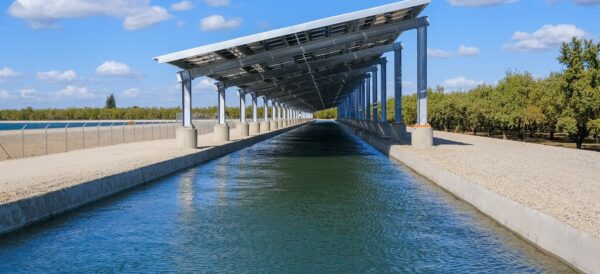The Nexus project, a 1.6 MW solar installation on the canals of the Turlock Irrigation District (TID) in California, is now complete and operational. The $20 million state-funded pilot is presented as a model for agricultural regions affected by water stress.
Two photovoltaic systems were installed, one spanning a 30-meter-wide section and another covering a 6-meter-wide canal in Stanislaus County. Both sites became fully operational in August 2025.
The project serves as a proof of concept to study the design, implementation, and co-benefits of canal-top solar. It uses TID’s infrastructure and grid access and is the first US effort of its kind to include collaboration between the public, private, and academic sectors.

A battery energy storage system has been installed at the narrowest canal site, using 75 kW iron flow batteries from U.S. manufacturer ESS.
Each ESS container provides 400 kWh of peak energy and has a lifespan of more than 20,000 cycles. The unit weighs 41.9 tons, measures 12 meters by 2.4 meters, and stands 2.9 meters tall. Its electrolyte system is fully recyclable, relying on recycled iron components and salt water.
The University of California, Merced, has deployed research equipment at both sites to collect baseline data. While the evaporative savings from Project Nexus are not yet known, a UC study estimated that covering California’s 4,000 km of canals could save 63 billion gallons of water annually – enough to irrigate 50,000 acres of farmland or supply more than 2 million residents. TID is also studying potential improvements in water quality from reduced vegetative growth.
This content is protected by copyright and may not be reused. If you want to cooperate with us and would like to reuse some of our content, please contact: editors@pv-magazine.com.








By submitting this form you agree to pv magazine using your data for the purposes of publishing your comment.
Your personal data will only be disclosed or otherwise transmitted to third parties for the purposes of spam filtering or if this is necessary for technical maintenance of the website. Any other transfer to third parties will not take place unless this is justified on the basis of applicable data protection regulations or if pv magazine is legally obliged to do so.
You may revoke this consent at any time with effect for the future, in which case your personal data will be deleted immediately. Otherwise, your data will be deleted if pv magazine has processed your request or the purpose of data storage is fulfilled.
Further information on data privacy can be found in our Data Protection Policy.